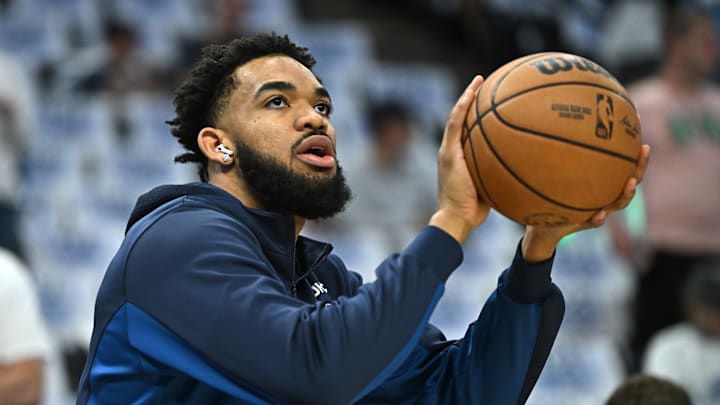The Minnesota Timberwolves have made one of their most significant moves in recent memory by trading franchise cornerstone Karl-Anthony Towns. While the decision to part ways with Towns might have seemed bold, the trade has positioned the Wolves for long-term success. Here’s why they won this trade.
Beyond moving him early in his prime, in terms of timing, the Timberwolves couldn't have picked a better moment to trade Karl-Anthony Towns. Over the past three seasons, Towns has had multiple significant injuries, averaging just 55 games per season over that stretch, including a 29 game regular season in 2022-23. While still a top talent when healthy, Towns’ declining availability was a definite concern.
Even more troubling was his contract. Towns is set to earn $49 million, $53 million, $57 million, and $61 million over the next four seasons—numbers that would make any team nervous, especially given his recent injury history. By contrast, Julius Randle, the centerpiece coming back to Minnesota in this trade, represents a potentially savvy acquisition.
Randle is coming off a situation in New York where he didn't fit the Knicks' long-term plans, but it’s important to remember that he’s still one of the league’s best power forwards. Despite coming off an injury, Randle was an All-Star in 2023-24. With a more reasonable cap hit of $29 million for the 2024-25 season and a player option of $31 million in 2025-26, Randle’s contract gives Minnesota flexibility.
If the fit works in Minnesota, Randle could be part of the Wolves’ long-term future. If not, the team could let him walk or move him in at the trade deadline as a potentially-expiring contract, and there will certainly be teams looking for cap space ahead of the strong 2025-26 free agency class.
Sold high on Towns, bought low on Randle
Adding Donte DiVincenzo to the mix is another win for the Wolves. DiVincenzo proved to be a reliable role player with playoff experience. Last season, he averaged 15.5 minutes per game in the regular season while shooting an impressive 40.1% from three. During the Knicks’ playoff run, he played crucial minutes, averaging 17.8 points per game and hitting 42.5% from beyond the arc.
At just under $12 million per season for the next three years, DiVincenzo's contract is a extremely positive asset. His shooting and experience will provide a valuable boost to the Timberwolves, particularly in the postseason.
A year ago, many NBA insiders, including ESPN’s Brian Windhorst, doubted whether the Wolves could even get a first-round pick for Towns. Fast forward to today, and Minnesota has turned Towns into a valuable package of Randle, DiVincenzo, and future first-round pick—a considerable haul for Towns given the context of his injury history and contract situation.
It really is an interesting exercise - who is the best player the Wolves could have reasonably gotten in a Towns trade?
Randle was the best player the Wolves could get for Towns
Given the NBA’s current landscape and Minnesota’s inability to package players in a trade while in the second apron, in terms of pure talent, it’s hard to imagine a better return for Towns than Julius Randle. While names like Brandon Ingram, Zach Lavine or Kyle Kuzma might have been available, Randle is probably the best available player in terms of both fit and talent that the Wolves could have acquired.
On top of that, the Wolves also secured DiVincenzo in the deal. In terms of maximizing Towns’ trade value, the Wolves nailed it. This trade wasn’t just about the players, though. Minnesota also acquired a valuable first-round pick from Detroit. While it’s protected, the likelihood that the pick conveys is strong. The first-round pick the Wolves acquired from Detroit is top-13 protected in 2025, top-11 protected in 2026, and top-9 protected in 2027.
If the pick doesn’t convey by then, it becomes a second-rounder. However, as Detroit’s young core of Cade Cunningham, Jalen Duren, and Jaden Ivey enters its prime, the Pistons are positioned to make noise in the weak bottom-half of the Eastern Conference at some point in the coming seasons.
The Detroit pick will likely convey
Adding J.B. Bickerstaff as head coach, who is coming off back-to-back playoff seasons with the Cavaliers, also has a chance to boost Detroit’s chances of pushing for playoff contention. If the Pistons improve as expected, that first-round pick is highly likely to convey sooner rather than later, making the pick the Wolves acquired a more valuable asset.
In summary, the Timberwolves sold high on Karl-Anthony Towns, whose recent injury history and contract made him a risky and financially-restrictive long-term piece for the franchise. In return, they acquired a slightly less productive but still impactful player in Julius Randle, a playoff-tested role player in Donte DiVincenzo, and a likely first-round pick from Detroit.
The flexibility Randle’s contract offers and the value of the Detroit pick give the Wolves plenty of options to continue improving. This trade wasn't just about moving on from Towns—it was about maximizing value and ensuring the flexibility to build competitive teams around Anthony Edwards.
For Timberwolves fans, this trade should absolute be viewed as a win.
